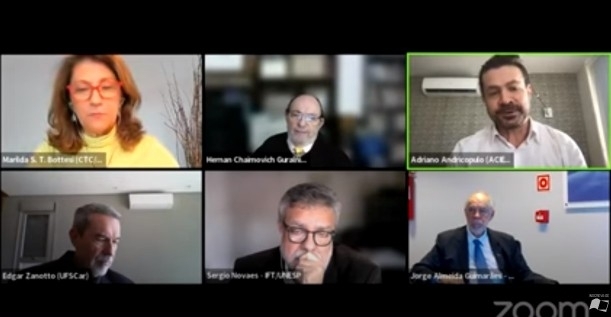

The São Paulo State Academy of Sciences presented the first chapter of a book on FAPESP’s 60 years of contributing to science for national development at the first in a series of online events that will continue until December and can be watched on Agência FAPESP’s YouTube channel (image: screenshot taken during the online event)
The São Paulo State Academy of Sciences presented the first chapter of a book on FAPESP’s 60 years of contributing to science for national development at the first in a series of online events that will continue until December and can be watched on Agência FAPESP’s YouTube channel.
The São Paulo State Academy of Sciences presented the first chapter of a book on FAPESP’s 60 years of contributing to science for national development at the first in a series of online events that will continue until December and can be watched on Agência FAPESP’s YouTube channel.

The São Paulo State Academy of Sciences presented the first chapter of a book on FAPESP’s 60 years of contributing to science for national development at the first in a series of online events that will continue until December and can be watched on Agência FAPESP’s YouTube channel (image: screenshot taken during the online event)
Agência FAPESP – Collaborative research combines endeavors, people and finance to enhance the quality of the science produced and increase the visibility of Brazilian researchers. It is no accident that fostering collaboration has been one of FAPESP’s main aims in the 60 years since its inception. The topic was discussed on June 1 at an online event organized by the São Paulo State Academy of Sciences (ACIESP), as the first in a series scheduled to continue until December.
Each event will revolve around a chapter of the book FAPESP 60 Anos: a ciência no desenvolvimento nacional (“FAPESP 60 Years: Science in the Nation’s Development”). The first chapter, entitled “Internationalization and Collaborative Research”, can be downloaded now.
“In this year of FAPESP’s sixtieth anniversary, ACIESP has taken the initiative of conducting a series of studies coordinated by our researchers on the status of science in São Paulo state. This is an important instrument for assessment and at the same time strategic planning, since it provides a view of the future of each area. Seven overarching themes have been chosen as being of paramount importance to present-day society, based on the conviction that science, technology and innovation are closely connected and should contribute to the wellbeing of society” said Marco Antonio Zago, President of FAPESP, in his opening remarks for the event.
Hernan Chaimovich, a professor at the University of São Paulo’s Institute of Chemistry (IQ-USP) and one of the authors of the first chapter, stressed that collaborative research is essential in today’s globalized society. “The internationalization of science must encompass all areas and regions of the country, and is a key dimension of the democratization of knowledge,” he said.
Vanderlan Bolzani, a professor at São Paulo State University’s Institute of Chemistry (IQ-UNESP) and President of ACIESP, said the themes addressed by the publication are aligned with the Sustainable Development Goals (SDGs) adopted by the United Nations. “They’re goals to be achieved by 2030, in the state that produces the highest percentage of science in Brazil, because it has FAPESP in its DNA,” she said.
Governance
According to Marilda Bottesi, a former special advisor on research collaboration to FAPESP’s Scientific Director, the internationalization policy has always sought to place researchers from São Paulo in key governance posts, strengthening the state’s position as a research hub recognized all over the world.
“Everyone gains from collaboration. Higher quality means higher-impact research, more visibility for researchers, and hence more funding for scientific production,” she said. Bottesi is a co-author of the chapter on internationalization in the book.
Helena Nader, President of the Brazilian Academy of Sciences (ABC), and Adriano Andricopulo, a professor at the São Carlos Institute of Physics (IFSC-USP), Executive Director of ACIESP and editor of the book, also took part in the event.
Also attending the event were Jorge Almeida Guimarães, President of the Brazilian Industrial Research and Innovation Company (EMBRAPII), Edgar Zanotto, a professor at the Federal University of São Carlos (UFSCar), and Sérgio Novaes, a professor at São Paulo State University’s Institute of Theoretical Physics (IFT-UNESP). All three are co-authors of the chapter on “Internationalization and Collaborative Research”.
A recording of the event can be watched at: youtu.be/9ZIAyTt0qro.
The first chapter of FAPESP 60 anos: a ciência no desenvolvimento nacional is at: 60anos.fapesp.br/aciesp.
The next event in the series will present the chapter entitled “Global Climate Change: Impacts and Strategies for Mitigation and Adaptation” on July 6 and can be watched live on Agência FAPESP’s YouTube channel (www.youtube.com/user/fapespagencia/about).
Republish
The Agency FAPESP licenses news via Creative Commons (CC-BY-NC-ND) so that they can be republished free of charge and in a simple way by other digital or printed vehicles. Agência FAPESP must be credited as the source of the content being republished and the name of the reporter (if any) must be attributed. Using the HMTL button below allows compliance with these rules, detailed in Digital Republishing Policy FAPESP.





